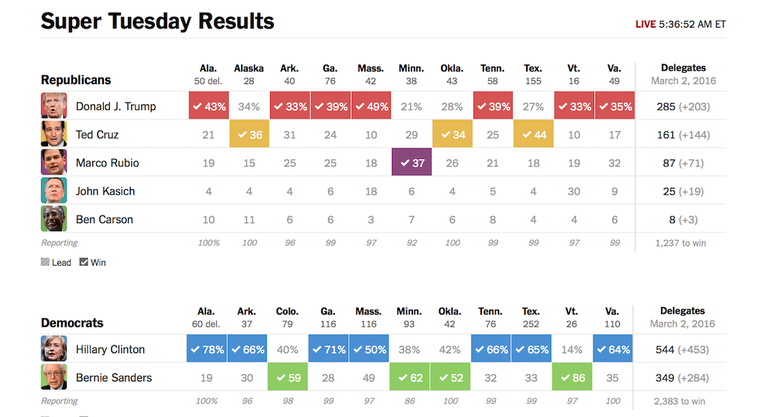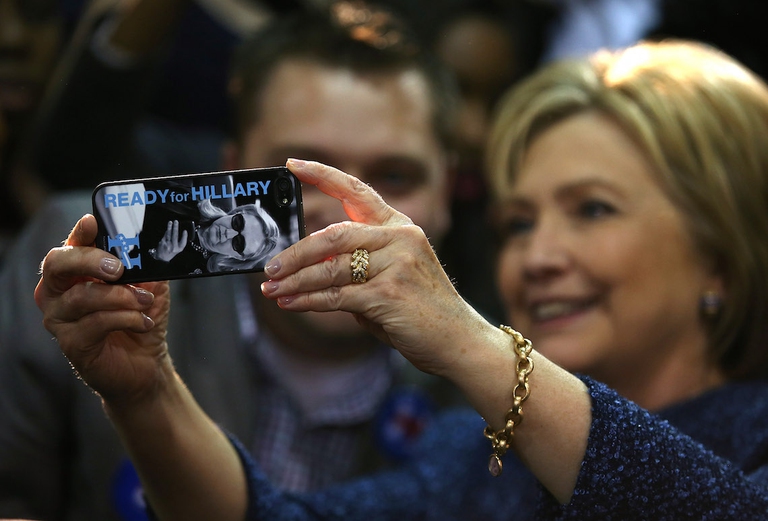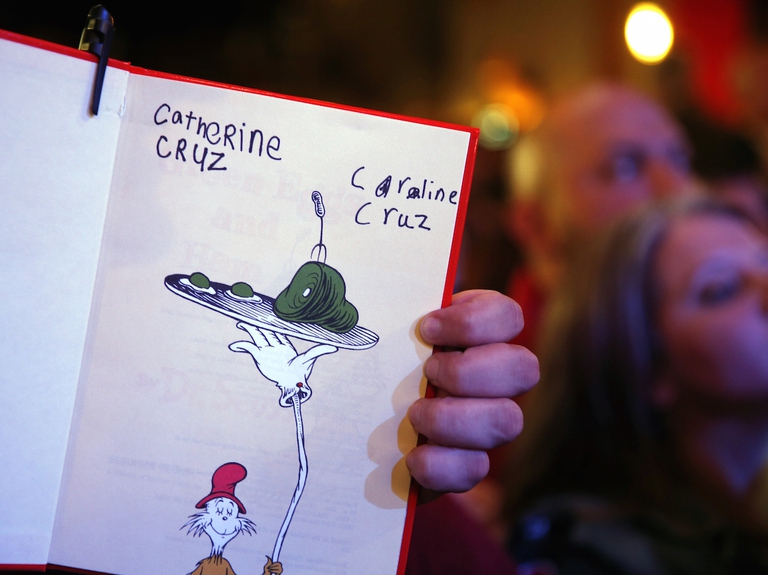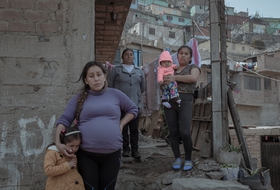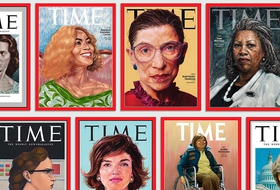
One in three women have suffered physical or sexual violence. With contributions from Europe, Africa, Asia and Latin America, we look at how this shadow pandemic affects every corner of the world.
Hillary Clinton and Donald Trump have consolidated their lead in the contest to become the presidential candidates for the Democratic and Republican parties, respectively. Twelve states plus American Samoa voted on the 1st of March, also known as Super Tuesday – the day in the US presidential primaries with the most delegates up for grabs.
Hillary Clinton and Donald Trump have consolidated their lead in the contest to become the presidential candidates for the Democratic and Republican parties, respectively. Twelve states plus American Samoa voted on the 1st of March, also known as Super Tuesday – the day in the US presidential primaries with the most delegates up for grabs. Clinton won seven states, Bernie Sanders four. In the opposite camp, Trump also clinched seven states, followed by Ted Cruz with three and Marco Rubio with one.
Super Tuesday as we know it began when twelve Southern states voted for in the Democratic primaries on the same day in 1988. They believed they would be able to influence the contest by selecting a candidate that would have better chances of winning the general election. The strategy didn’t work and Republican George H.W. Bush became president, but it paid off with the election of Democrat Bill Clinton, Super Tuesday winner in 1992.
Super Tuesday this year determined the allocation of nearly a quarter of Republican and a fifth of Democratic delegates, those party members who will cast the definitive vote for the candidates, based on the preferences expressed by their state, at the party conventions over the summer.
The day unfolded more or less as expected. Clinton won the key demographic of black voters. Sanders received the overwhelming majority of support in his home state of Vermont and Cruz won in his home state of Texas, the Super Tuesday primary in which most delegates were allocated. Trump was able to capture a cross-section of Republican voters notwithstanding a last minute controversy that saw him accused of not refuting the endorsement of David Duke, former leader of white supremacist organisation the Ku Klux Klan.
The candidates of both parties were awarded delegates in proportion to the votes they received and it would have been impossible for Super Tuesday to seal the fate of the primaries definitively. Whilst Clinton leads over Sanders by around two hundred delegates and Trump’s advantage over Cruz is of over a hundred, unlikely as it may be, technically the tables could still turn.
Clinton and Trump have now set their eyes on the more important contest that will probably see them battling each other to become president. In her Super Tuesday victory speech, the Democratic frontrunner made a clear reference to Trump saying, “the stakes in this election have never been higher and the rhetoric we’re hearing on the other side has never been lower,” while the leader of the Republican primaries stated, “our country is going to hell and Hillary Clinton doesn’t have a clue,” in his. Trump was calm and composed during the speech compared to his usually brazen and uncompromising style, speaking of uniting the party and congratulating Cruz on his wins. A more sobre Trump seems an ever likelier presidential candidate – and an increasingly difficult monster to slay for Democrats and Republicans alike.
Siamo anche su WhatsApp. Segui il canale ufficiale LifeGate per restare aggiornata, aggiornato sulle ultime notizie e sulle nostre attività.
![]()
Quest'opera è distribuita con Licenza Creative Commons Attribuzione - Non commerciale - Non opere derivate 4.0 Internazionale.
One in three women have suffered physical or sexual violence. With contributions from Europe, Africa, Asia and Latin America, we look at how this shadow pandemic affects every corner of the world.
The Istanbul Convention against gender-based and domestic violence marks its tenth anniversary. We look at what it is, who its signatories are, and what the future might hold.
European Commission President Ursula von der Leyen reminded us of the gravity of violence against women around the world, and of the Istanbul Convention’s utmost importance.
President Erdoğan has pulled Turkey out of the Istanbul Convention, key in the fight against gender violence, claiming that it favours the LGBT community rather than family values.
Violence against women in Peru has increased as a result of Covid-19 lockdowns. 14,912 people were reported missing from January to November 2020, more than half of them minors and 64 per cent women. People have been confined to their homes for months, many forced to endure poor physical, economic and social conditions. A situation that
Joys Estefani Qqueccaño Huamani, 24, disappeared from her rural community in Peru on 9 October. Her family began looking for her independently of the authorities and despite the resistance of relatives of Joys Estefani’s ex-partner Arturo Ccana Condori, 32, charged with committing violence against her on 28 September, eleven days before Joys Estefani disappeared. Photos
Costa Rica celebrated its first same-sex marriage when two women, Alexandra Quiros and Dunia Araya, celebrated their wedding: an “extraordinary moment”.
The pandemic and its restrictions are affecting everyone, without exceptions. However factors like housing, income inequalities, gender, access to technology and working conditions are influencing how people experience the health crisis.
Time magazine’s 100 Women of the Year project sheds light on influential women’s stories, from Amelia Earhart to Greta Thunberg. A selection of some of the greats for International Women’s Day.
